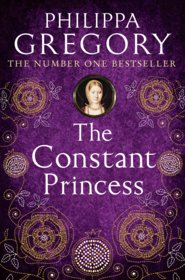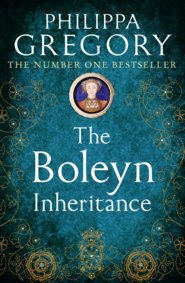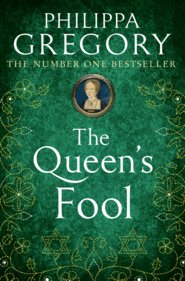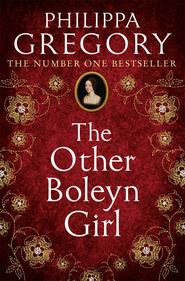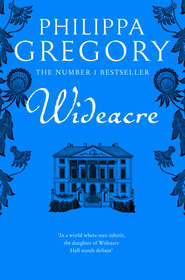По всем вопросам обращайтесь на: info@litportal.ru
(©) 2003-2025.
✖
The Other Queen
Автор
Год написания книги
2019
Настройки чтения
Размер шрифта
Высота строк
Поля
I hide my pleasure. ‘And do you have any idea how long she will stay with us?’
‘She will go home to Scotland this summer,’ he says. ‘The inquiry has cleared her of any wrongdoing; our queen is certain that there is nothing against her. Indeed, she seems to have suffered much injustice. And her lords put themselves utterly in the wrong by holding her prisoner, and making her abdicate her throne. We cannot tolerate this in a neighbour. To throw down a queen is to overthrow the natural order. We dare not let them do it. It is to go against the order of God. She has to be restored and the rebels punished.’
‘Will we escort her home?’ I ask. I am thinking of a royal progress to Edinburgh, of the castles and the court.
‘Our queen will have to send an army to secure her safety. But the lords have agreed to her return. Her marriage to Bothwell will be annulled and they will bring her husband Lord Darnley’s murderers to trial.’
‘She will be queen in Scotland again?’ I ask. ‘Despite Cecil?’ I try to keep the doubt from my voice but I shall be very surprised if that arch plotter has an enemy queen in his hands and quietly sends her home in comfort, with an army to help her.
‘What has Cecil to do with it?’ he asks me, deliberately obtuse. ‘I don’t think that Cecil can determine who is of royal blood, though he thinks to command everything else.’
‘He cannot want her restored to power,’ I say quietly. ‘He has worked for years to put Scotland under English command. It has been the policy of his life.’
‘He cannot prevent it,’ he says. ‘He has no authority. And it will be something then, my Bess, for us to be the dearest friends of the Queen of Scotland, don’t you think?’
I wait for the two girls to finish turning down the bed, curtsey and leave the room. ‘And of course, she is heir to England,’ I say quietly. ‘If Elizabeth returns her to Scotland she is acknowledging her as queen and her cousin, and so it is to acknowledge her as the heir. So she will be our queen here, one day, I suppose. If Elizabeth has no child.’
‘God save the queen,’ George says at once. ‘Queen Elizabeth, I mean. She is not old, she is healthy she is not yet forty. She could yet marry and have a son.’
I shrug. ‘The Queen of Scots is a fertile woman of twenty-six. She is likely to outlive her cousin.’
‘Hush,’ he says.
Even in the privacy of our bedroom, between two loyal English subjects it is treason to discuss the death of the queen. Actually, it is treason to even say the words ‘death’ and ‘queen’ in the same sentence. We have become a country where words have to be watched for betrayal. We have become a country where you can hang for grammar.
‘Do you think the Scots queen is truly innocent of the murder of Lord Darnley?’ I ask him. ‘You saw the evidence, are you sure she was not guilty?’
He frowns. ‘The inquiry closed without a decision,’ he says. ‘And these things are not a matter for women’s gossip.’
I bite my tongue on an irritable reply. ‘It is not for gossip that I ask you,’ I say respectfully. ‘It is for the safety and honour of your house.’ I pause. He is listening now. ‘If she is the woman that they say – a woman who would murder her husband in cold blood and then marry the man who did the deed for her own power and safety – then there is no reason to think that she would not turn against us, if it was in her interest to do so. I don’t want my cellars packed with gunpowder one dark night.’
He looks aghast. ‘She is a guest of the Queen of England, she will be restored to her own throne. How can you think that she would attack us?’
‘Because if she is as bad as everyone says, then she is a woman who will stop at nothing to gain her way.’
‘There is no doubt in my mind that Lord Darnley, her own husband, was in a plot against her. He had joined with the rebel lords and was guided by her half-brother, Lord Moray. I think together they planned to throw her down and imprison her and put him as king consort on the throne. Her half-brother would have ruled through Darnley. He was a weak creature, they all knew that.’
I nod. I knew Darnley from a boy, a boy horridly spoiled by his mother, in my opinion.
‘The lords loyal to the queen made a plot to kill Darnley, Bothwell probably among them.’
‘But did she know?’ I demand. It is the key question: is she a husband-killer?
He sighs. ‘I think not,’ he says fairly. ‘The letters that show her ordering the deed are certainly forgeries, the others are uncertain. But she was in and out of the house while they were putting the gunpowder in the cellar, surely she would not have taken the risk if she had known of the danger. She had planned to sleep there that night.’
‘So why marry Bothwell?’ I demand. ‘If he was one of the plotters? Why reward him?’
‘He kidnapped her,’ my loyal husband says quietly, almost in a whisper. He is so ashamed by the shame of the queen. ‘That seems certain. She was seen to be taken by him without her consent. And when they came back to Edinburgh he led her horse by the bridle so that everyone could see she was his captive and innocent of a conspiracy with him.’
‘Then why marry him?’ I persist. ‘Why did she not arrest him as soon as she was safe in her castle and throw him on the scaffold?’
He turns away, he is a modest man. I can see his ears going red from a blush. He cannot meet my eyes. ‘He did not just kidnap her,’ he says, his voice very quiet. ‘We think he raped her and she was with child by him. She must have known herself to be utterly ruined as a woman and a queen. The only thing she could do was to marry him and pretend that it was by consent. That way at least she kept her authority though she was ruined.’
I give a little gasp of horror. A queen’s person is sacred, a man has to be invited to kiss her hand. A physician is not allowed to examine her, whatever her need. To abuse a queen is like spitting on a holy icon; no man of conscience would dare to do it. And for the queen to be held and forced would be like having the shell of her sanctity and power broken into pieces.
For the first time, I feel pity for this queen. I have thought of her so long as a monster of heresy and vanity that I have never thought of her, little more than a girl, trying to rule a kingdom of wolves, forced in the end to marry the worst of them. ‘Dear God, you would never know to look at her. How does she bear it? It is a wonder that her spirit is not broken.’
‘So you see, she will be no danger to us,’ he says. ‘She was a victim of their plotting, not one of the plotters. She is a young woman in much need of friends and a place of safety.’
There is a tap at the door to tell me that my private household is assembled in our outer chamber, ready for prayers. My chaplain is already among them. I have household prayers said every night and morning. George and I go through to join them, my head still spinning, and we kneel on the cushions that I have embroidered myself. Mine has a map of my beloved Derbyshire, George’s shows his family crest, the talbot. All of my household, from pageboy to steward, kneel on their cushions and bow their heads as the chaplain recites the prayers for the evening. He prays in English so that everyone may speak to God together in language that we all understand. He prays for the kingdom of God and for the kingdom of England. He prays for the glory of heaven and the safety of the queen. He prays for my lord and for me and for all these souls in our care. He thanks God for the gifts we enjoy, as a result of Elizabeth on the throne and the Protestant bible in the churches. This is a godly Protestant household and twice a day we thank God who has rewarded us so richly for being His people, the best Protestants in Christendom. And so we remind everyone – me as well – of the great rewards that come from being a godly Protestant household in the direct charge of a Protestant God.
This is a lesson that the Catholic queen may learn from me. We Protestants have a God who rewards us directly, richly, and at once. It is by our wealth, our success and our power that we know that we are the chosen. Who can doubt God’s goodness to me, when they see my house at Chatsworth, now three storeys high? Who, if they saw my accounts books with the figures marching so strongly down to the bottom line, could doubt that I am one of the chosen, one of the specially favoured Children of God?
1569, Spring, Tutbury Castle: George (#ulink_d483f32c-ba3b-59f4-a6d8-aa15e4831e28)
I am surprised to have no instructions yet from the queen to prepare for the journey to Scotland, though I look for a command every day. I had expected by now to have been ordered to prepare a great escort to take the Queen of Scots home. In the absence of any message, the days go on, the weather improves, and we are starting to live together as a household, a royal household. It is a great honour and I have to remind myself not to become overproud of the good management of my wife and the lineage of my guest. She seems to be enjoying her visit with us, and I cannot help but be glad that we are her hosts in England. What benefits may flow from this friendship I would not stoop to calculate, I am not a paid companion. But of course, it goes without saying, that to be the trusted and most intimate friend of the next Queen of England has to be an advantage, even to a family already well established.
I receive a note, not from the queen herself, but from Cecil, who tells me that we must hold the other queen for only a few days longer while the Scots negotiate for her safe return to her kingdom and her throne. Then she will leave. The Scots have agreed that they will have her back as queen and she will return to her country with honour, this very month.
The relief for me is tremendous. Even though I know that our inquiry cleared her, and the queen herself is defending her cousin’s name, I was anxious for her. She is so young, and without advisors. She has neither father nor husband to defend her, and she has such enemies ranged against her! And the more time I spend with her the more I hope for her safety, even for her success. She has a way – I have never known such a woman before – she has a way of making everyone feel that they would like to serve her. Half of my household is openly in love with her. If I were a bachelor, or a younger man, or a fool outright, I would say that she is enchanting.
The same messenger from London brings me a packet from Thomas Howard, Duke of Norfolk, and I open it slowly. He has such a passionate opposition to the growing power of Cecil, to the fearful England that Cecil is making, that I think this may be the invitation to be part of some plot against the Secretary of State. If he is inviting me to join against Cecil I will be hard put to refuse him. Indeed, in honour, I think I cannot refuse him. The man has to be curbed if not stopped outright and we lords are the ones who will have to do it. For a moment I consider going to find Bess so that we can read his letter together. But then curiosity is too much for me and I open it. A sealed package falls from the inside, into my hands with this note:
Shrewsbury, please convey this letter to the Queen of Scots. It is a proposal of marriage from me and has the blessing of all the other lords. I trust to your discretion. I have not yet told Her Grace the Queen of my intention; but Leicester, Arundel and Pembroke all think this a good solution to the current difficulty, returning her to her throne with an English connection and preventing a foreign husband. It was suggested by the Scots lords themselves, as a way to guarantee her safe return with a reliable Protestant Englishman at her side. I hope she will marry me. I believe it to be her safest route, indeed her only route,
Norfolk.
I think I had better take this to Bess.
1569, Spring, Tutbury Castle: Bess (#ulink_7335fdb0-30cd-5d9c-8614-a3428f48c940)
Our days have fallen into a rhythm dictated by the queen, who rules this castle as her own palace, as I suppose she should. In the morning she prays and hears Mass in her own way with her secretary who, I imagine, is an ordained priest. I am supposed not to know, and so I do not ask, though I am required to give him four square meals a day and fish on Friday.
I have made sure that my household know that they are not to join nor even to listen to the heresies that take place behind the closed doors of her lodgings, and so I hope to confine the confusion and distress that always follows the rule of Rome to her rooms. But once she has done with heretical mutterings, and taken her breakfast in her rooms, she likes to ride out accompanied by my husband the earl. She has ten horses that are taking up ten loose boxes in our stables, and are feeding well on our oats. She rides with my lord and his guard in the morning while I go to the small parlour that I have set aside for my business and I meet with the stewards of all my houses and ventures who report to me either by letter or, when there is trouble, in person.
This is a system of my own devising, based on my first lessons from my dear Cavendish with the housekeeping books. Each manor, each house has its own book, each has to meet its own costs. By treating each parcel of land as a separate kingdom I make sure that they each make money. It may seem obvious – but this is unique. I know no other landlord who does it. Unlike me, my lord’s stewards who work in the old ways bundle all their accounts together, use land as security against loans for cash, endow it, buy it, sell it, mortgage it and entail it away on heirs. At best they can always keep my lord’s treasure room rich with cash; but at worst they never know what is earned and what is borrowed and what is owed. Badly handled, a whole fortune can slip through the fingers of a landlord and go out of the family altogether. They can never know if they are in profit or loss, there is a continual exchange of land into debt, into cash, and back to land again. The value of the land changes, even the value of the currency changes, and this is beyond their control – they can never know for sure what is happening. This is the way that the nobility run their business, grandly but vaguely; whereas I run mine like a poor woman’s household and know to a penny what I am worth at the end of every week. Of course, they start with an enormous fortune. All they have to do is not to squander their wealth, whereas I started from nothing and nothing is easily counted. But a landlord like me – a newcomer – has to watch every penny and every acre, has to be alert to every change. It is a different view of the land, and my view is a novelty. Never before was there a landlord in England like me. Never in the world, for all I know, was there a woman in business like me.
Only a trader at his stall, only a cobbler at his last, would understand the pleasure I have at knowing the cost of things, and the profit from things, and the balancing of the books. Only a woman who has been poor would know the heartfelt sense of relief that comes from looking at the household accounts books and seeing a profit. There is nothing that warms my heart more than knowing that I am safe in my house, with cash in my treasure room, with land at my doorstep, and my children endowed or well married. Nothing in the world is better for me than the sense that I have money in my purse and that no-one can rob me.
This should be a strength of course, but it means that any loss strikes me hard. For within the first week of having the Scots queen as our guest, I have a letter from the Lord Treasurer’s office telling me that we will be paid fifty-two pounds a week for hosting the Queen of Scots. Fifty-two pounds! A week!
After my initial dismay I cannot say that I am surprised. Anyone who has served at court knows that Queen Elizabeth is as mean with her money as when she was a bankrupt princess. She was brought up as a girl who was sometimes heir, sometimes pauper, and it has left her with a terrible habit of penny pinching. She is as bad as I am for keeping watch over a groat. She is worse than me, for it is her trade as queen to be generous; whereas it is my trade as a subject to turn a profit.
I look at the letter again. I calculate that she is offering us about a quarter of what we are paying out at present for the pleasure of housing and entertaining our guest. They, in London, have calculated that this queen will be served with thirty people and have a stable of six horses. In truth she has a household of double that number as well as a good hundred of trouble-makers and admirers and followers who have settled in Tutbury and nearby, but visit us constantly, especially at mealtimes. We are not housing a guest with a retinue, we are housing a full royal court. Clearly, the Treasury will have to pay us more. Clearly, this Scots queen’s companions will have to be sent back to their homes. Clearly, I shall have to persuade my husband to make these unwanted announcements, since no-one else can tell the two queens that their arrangements are unworkable. My difficulty is that George will not like to do this, being a lord who has never had to deal with money, and never in his life drawn up an accounts sheet. I doubt I can even make him understand that we can barely afford this; not now, not for this month, certainly not till midsummer.
In the meantime I will have to send to my steward at Chatsworth and tell him to take some of the smaller pieces of silver down to London and sell them for cash. I cannot wait for the rents at quarter day; I have to buy things in Tutbury and pay extra servants, and for this I need more coin than I earn. I could laugh at my own sense of loss when I write to him to sell half a dozen silver plates. I have never used them but they are mine, hoarded away in my own treasure room. To sell them for their value as scrap is as painful to me as a personal loss.
At midday the hunting party comes home. If they have killed on the hunt then the meat goes straight to the kitchens and is an essential addition to the provisioning of this great household. We dine altogether in my lodgings, on this sunny side of the courtyard, and in the afternoon the queen often sits with me in my presence chamber for the light is better for sewing, and the room brighter, and her women can sit with mine and we can all talk.






